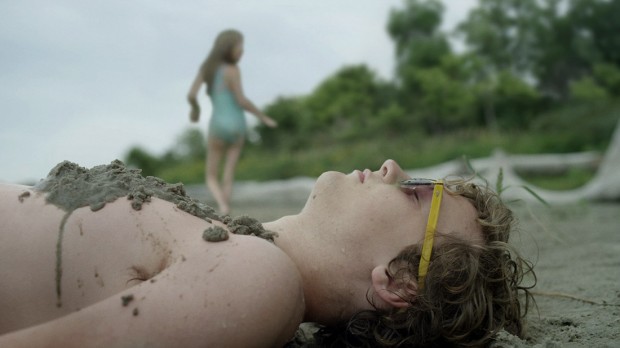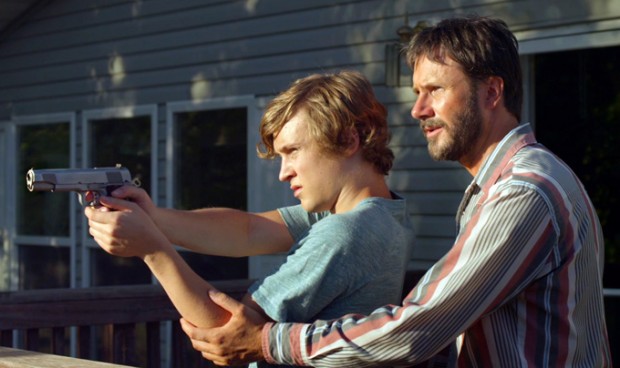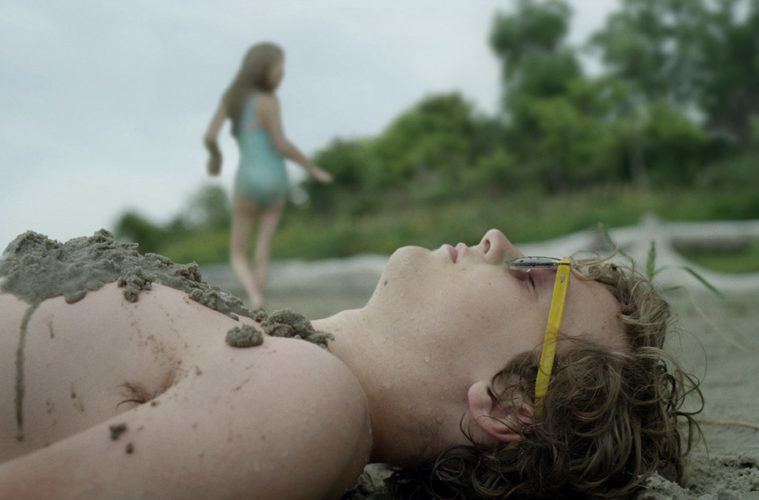
A strong and impressive debut, Take Me To The River was one of the most accomplished features we saw at Sundance. Telling the story of a teenager Ryder (Logan Miller) accused of an act he did not commit at a family reunion, the film features strong performances by Robin Weigert as his mother and Josh Hamilton as his uncle with ambiguous intensions. Tightly paced and engaging, Take Me To The River is best seen cold, so we did our best to avoid spoilers when talking with its writer/director/producer, Matt Sobel. Check out our full conversation below.
The Film Stage: You had mentioned last night before the screening that the film was six years in the making?
Matt Sobel: I wrote the film while I was still in undergrad art school, that six-year process was not just developing this project but me also figuring out how to be a filmmaker as well, and especially how the business works. In a lot of ways, also becoming an adult. I felt like I was pre-adult when I wrote the story, and it’s about this kid maturing. The idea was inspired by these real-life family reunions I’d go to every year in Nebraska. The farm in the film is my family’s farm in Nebraska, all of our locations were filmed on their property, and that house is where my mother grew up. But, the drama of the story is all fictional, and that came from a dream I had where I was falsely accused of something deceitful.
I noticed you’re the sole producer on the film – how did that come to be?
In the process we had many different plans for how the film was going to be made. A producer or two passed through the project, in the end I decided I wanted to make it for a more reasonable budget and do it on our family farm. The other options almost felt like they weren’t working out, so I decided to do the project myself. Our line producer was really more of a co-producer – me and Billy (Mulligan) were really on the ground during production.
Did they want you to shoot where there would have been bigger tax incentives?
There were many other plans to shoot in Winnipeg – it was going to be a German/Canadian/American co-production. There were also plans to shoot in upstate New York, I went on a lot of location scouts and in the end, I felt like we should bring it back to that location (Nebraska).
I’m curious about the role of the development labs, which I see shaping independent films at various festivals lately – how did it take shape and what help did you have from these labs and grants?
That was absolutely when I crossed over from being an outsider at these film markets trying to get people to read my script to feeling I had traction with financial people I wanted to work with. And the first thing that happened was Binger Film Lab, which is Amsterdam based accepted the film and I was at the writing and directing lab for a year, living in Amsterdam. That was an incredible experience, I didn’t know anyone else in the city nor did anyone else that was coming into the lab so we all formed a very close bond living together for a year and working on each other’s films. That was development in the first stage, and a lot of people from that either went on to be crew in the film or helped me and connected me to people I’d end up working with anyway. We also applied with a rough cut of the film to IFP’s lab, and they were helping us complete a fine cut of the movie and navigate sales and distribution with workshops to help orient us because we were new to this. And Sundance as well, they gave us a finishing grant recently, but it was not at the Sundance development lab.
Let’s talk about the movie – one of the things I think you really nailed was the family dynamics – especially between Ryder and his mother and father – they were spot on. Can you talk about casting and working to build that dynamic?
Casting was really hard. The hardest part of casting for me was for me to get out of my head the fact I had lived with these characters for four years already at this point and that they were somewhat inspired by real people. Especially the mother-son relationship and it’s rumination on my own relationship with my mother when I was 17 but it’s more intense than that. A lot of these characters were going to be nothing like my actual family. Basically Robin (Weigert) came on first and really helped me develop the story in the final stages and from that point on I saw about 60 kids for Ryder and was just sort of imagining who could be in the same world as Robin, I consulted with her about our choices there and we both felt that Logan (Miller) seemed to natural inhabit that place of awkward teenager that it seemed quite effortless for him. Richard Schiff came on at the very last minute actually – four days before we started shooting, but he had been a long first choice of mine for that role but we couldn’t secure that until four days before we started shooting.
How about Ursula Parker? She gives such a brave and daring performance for someone so young, especially what’s required of her by the story. How did you work with her?
I was petrified, absolutely petrified about not being able to find someone who could do this part and she was not cast incredibly early. We had a start date set and did not have that role cast – and that was putting knots in my stomach because it’s an incredible thing to ask of such a young actress. But, I was familiar with her from Louis and I loved her on that show and always thought in the back of my mind she’d be great. She has one of the most singularly particular energies that I’ve ever seen in a young actress, she is, in reality, she can be terrifying intense and flip back to being a normal little girl. She has elements of her that are way beyond her age and elements of her that are a normal ten year old girl, and I felt that that was right for this role – someone that you couldn’t really track. And the less you couldn’t follow her and the more interesting she became. Working with her was a whole other kind of challenge that required a lot of thought. One of the people whom I mentioned I collaborated with in Amsterdam, she’s a children coach in Belgium and that’s a sort of respected in Europe I feel, she’s not just a handler, she’s a director of children and I brought her over specifically to help me with her.

The way that the film uses the landscape out in Nebraska is really quite brilliant. I imagine taking the actors out into rural Nebraska also helped shape their process?
The landscape was integral part of the story from the first time that I imagined it, because I was envisioning these actual places that I had been visiting for my whole life. And that’s also why it’s so hard for me to find those locations elsewhere, all of those locations exist on my family’s plot of land and they’re all within miles of each other. I thought that something there was something that felt very interesting location-wise as well and somewhat elemental: there’s the only farmhouse, shake, the uncle’s house, and river and they’re all separated by these dells – and that’s the way the space really is. Then we kind of came across this idea of having everything look sort of like a child’s coloring book, and did things like the opposite how you think things might be presented – not dramatically but very flat and kind of simple and inviting, directly contrasting the behavior that was going on in it. This idea more fully evolved as someone suggested to me I should really watch Picnic at Hanging Rock and everything felt like the landscape was not just a character but a force that was acting upon the characters, and so we went back to do pick-ups of just the landscapes that was very much in my mind – especially how the landscape creates a kind of altered state of consciousness in these characters’ minds.
The tone of the film continually changes – switching from comedy to drama and then into some very dark territory – I was watching it on the edge of my seat thinking someone physically or emotionally violent could happen – I was wondering how that was shaped in post with your editor Jacob Secher Schulsinger (of Force Majeure)?
I hope I never have to make a movie without Jacob again; working with him was the best experience I ever had. The tone you’re talking about was very much in the script and sort of inspired by films like Dogtooth. Specifically shaping it and editing it, and getting close to that tone Jacob came up with this interesting idea of never quite letting the audience understand the resolution of each beat. In a long scene like in conversation at the dinner table at the Uncle’s house, there were maybe five beats in that scene and he cut the last three or lines out of each and had another beat interrupt the previous one. I think that’s where the lean forward feeling comes from; you never feel that you completely resolve anything until the end. I think that’s sort of Jacob’s special trick, when you think about it – it kind of shouldn’t work, and I’ve seen different cuts when it didn’t work.
Were there any other references you looked at? Again, I’m trying thing of a way we can describe the tone for our readers without telling them exactly what they’re in for when they see this film.
I’ve written hundreds of versions of synopses and loglines throughout writing the script and never felt like I could effectively communicate what it felt like to watch the movie with any of these synopses because by design I wanted to make a film that was as difficult to summarize and here I am trying to do the opposite. I think what we arrived at is I’m going to say as little as possible about the events in the plot and focus much more on how it makes you feel while watching it because that was my goal in the beginning to have a film that was much more about the visceral sensation rather than be about clever metaphorical meanings or its subject matter, I think that conversation will happen at dinner after the movie – but first and foremost I wanted to make something that hits you in the gut while watching it. I was thinking about it in terms of that sensation.
The moment I realized I wanted to do something like this was after watching Cache, and there’s that amazing scene where he slits his throat – I remember how amazingly unique the feeling I got right after that and I didn’t know it was possible to make me feel like that and that’s when I decided I wanted to make something that made me feel before I thought. And, so other films of like The White Ribbon – in terms of branching out storylines cut in negative spaces. Their was a lecture I heard Michael Haneke give about The White Ribbon where he discussed leaving potentially the most interesting part of the action outside of the frame, and I thought that would be great if we could do that narratively to kind of invite the viewer to create that along side us. I really love the experience of reading a book sometimes more than seeing a film because you have to really do the work – so the idea was to make a film that would invite the viewer to do some of that work.
That certainly seems reflected in the editing style where you haven’t always provided a resolution to the beats, and I think Haneke does this in particular when he holds on a frame perhaps providing us with more information that will then complicate our understanding of a situation by not just giving us the simple answer.
Yes, my editor and I developed this idea that every line of dialogue said is not a line a dialogue that an audience is not able to come to on their own. There’s an example where he’s cleaning off the graffiti off the car and in the script and when we shot it she gave him an answer – and Jacob asked me what would happen if she was just as evasive – and it would give five more seconds to think of who could have done this – and now we’re thinking of all the characters we’ve met so far. And we start to come up with ideas – and that was very in line with what I wanted even that’s not how we shot this.
How has it been received back in Nebraska, has your family seen it?
I have been totally shocked, no one in my family has seen the full version of it yet but they’ve seen parts and were there for filming and I was totally shocked that the things they were most interested in were seeing things they knew on camera. I guess that makes sense – the whole more was kind of a novelty but as part as getting a read on the story, I don’t know if and when that’ll ever happen.
Good luck with the film – I’ll be keeping an eye out it.
Thanks so much.

Take Me to the River premiered at Sundance Film Festival.


